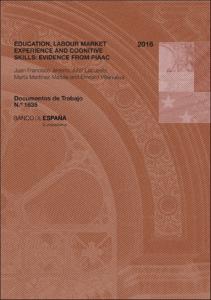Education, labour market experience and cognitive skills : evidence from PIAAC
Autor
Fecha de publicación
30-dic-2016
Descripción física
40 p. : gráficos, tablas
Resumen
En este documento se analiza la forma en que la educación académica y la experiencia profesional correlacionan con el nivel de capital humano, medido por la capacidad cognitiva demostrada en diferentes exámenes numéricos y de comprensión lectora según los datos de la OCDE obtenidos para el estudio PIAAC en 13 países. Se obtienen dos resultados principales. En primer lugar, la experiencia laboral correlaciona con los resultados de los exámenes, especialmente para los individuos de baja cualificación. En segundo lugar, a través de un modelo de efectos fijos que permite controlar por la habilidad inicial de los individuos, se comprueba que los individuos con trabajos intensivos en tareas numéricas en comparación con tareas de comprensión lectora obtienen mejores resultados relativos en el test numérico. Estos resultados se han obtenido principalmente entre individuos jóvenes con bajo nivel de cualificación, lo que hace suponer que la autoselección de los individuos en distintos trabajos desempeña un papel menor. Con estos resultados, se podría argumentar que la contribución del aprendizaje en el puesto de trabajo a la formación de habilidades podría llegar a ser una cuarta parte de la que aporta la educación obligatoria en la muestra de países que se utiliza en nuestro análisis
We study how formal education and experience in the labour market correlate with measures of human capital available in thirteen countries participating in the Program for the International Assessment of Adult Competences (PIAAC), an international study assessing adults’ proficiency in numeracy and literacy. Two findings are consistent with the notion that, in producing human capital, work experience is a substitute for formal education for respondents with compulsory schooling. Firstly, the number of years of working experience correlates with performance in PIAAC mostly among low-educated individuals. Secondly, individual fixed-effect models suggest that workers in jobs intensive in numerical tasks – relative to reading tasks – perform relatively better in the numeracy section of the PIAAC test than in the reading part. The results are driven by young individuals with low levels of schooling and hold mainly for simple tasks, suggesting that our findings are not fully generated by the sorting of workers across jobs. A back-of-the-envelope estimate suggests that the contribution of on-the-job learning to skill formation is a quarter of that of compulsory schooling in the countries we analyse
We study how formal education and experience in the labour market correlate with measures of human capital available in thirteen countries participating in the Program for the International Assessment of Adult Competences (PIAAC), an international study assessing adults’ proficiency in numeracy and literacy. Two findings are consistent with the notion that, in producing human capital, work experience is a substitute for formal education for respondents with compulsory schooling. Firstly, the number of years of working experience correlates with performance in PIAAC mostly among low-educated individuals. Secondly, individual fixed-effect models suggest that workers in jobs intensive in numerical tasks – relative to reading tasks – perform relatively better in the numeracy section of the PIAAC test than in the reading part. The results are driven by young individuals with low levels of schooling and hold mainly for simple tasks, suggesting that our findings are not fully generated by the sorting of workers across jobs. A back-of-the-envelope estimate suggests that the contribution of on-the-job learning to skill formation is a quarter of that of compulsory schooling in the countries we analyse
Publicado en
Documentos de Trabajo / Banco de España, 1635
Materias
Capital humano; Tareas; Educación; Experiencia laboral; Habilidades cognitivas; Human capital; Tasks; Education; Working experience; Cognitive skills; Mercado de trabajo
Aparece en las colecciones:












